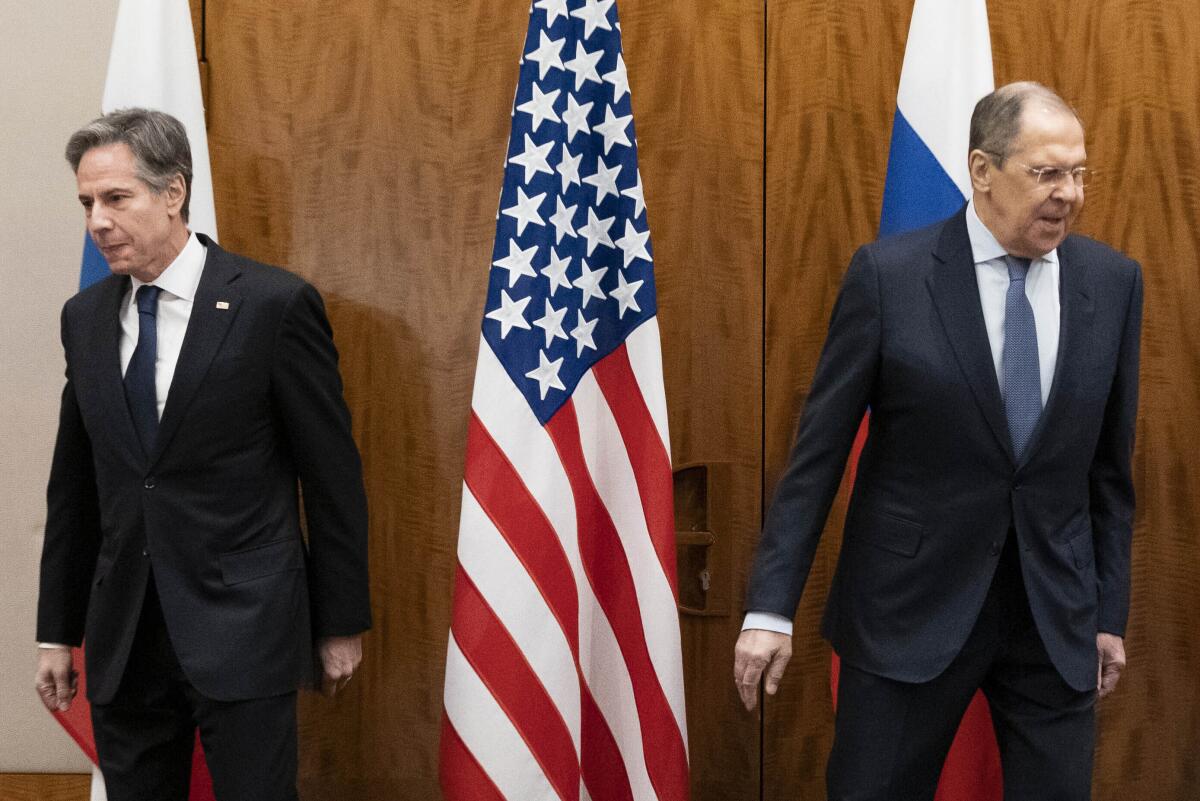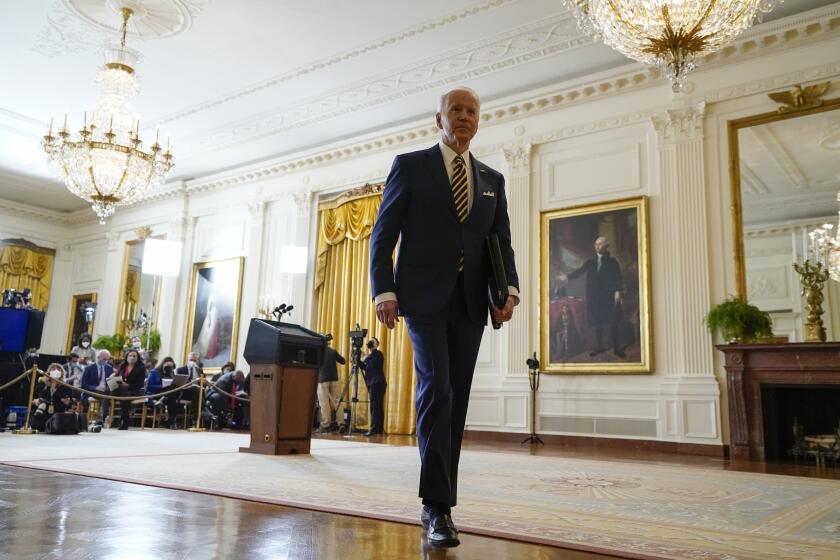Russia, U.S. fail to resolve differences in talks to avoid Moscow invasion of Ukraine

- Share via
WASHINGTON — The top diplomats from Russia and the United States held “frank” talks Friday but failed to resolve deep differences over Ukraine, as the U.S. races to avert what it believes could be a new war in Europe.
Secretary of State Antony J. Blinken said he told his Russian counterpart that the movement of any of Moscow’s troops into Ukraine would be met with a “swift, severe and united” retribution from the U.S. and NATO.
“We will continue to prepare, resolutely, to both paths that we have laid out for Russia: the path of diplomacy and dialogue, or the path of renewed aggression, confrontation and consequences,” Blinken told reporters after a 90-minute session with Russian Foreign Minister Sergei Lavrov in Geneva, wrapping up a whirlwind week of diplomacy that also took him to Berlin and the Ukrainian capital of Kyiv.
Lavrov continued his country’s denial of plans to invade the former Soviet republic and said Russia’s troops along its border with Ukraine — estimated at more than 100,000 — are there for military exercises. Moscow is calling up reserves in Russia and has dispatched troops to ally Belarus, on Ukraine’s northern border.
The U.S. has warned that Russia is planning an attack similar to its 2014 invasion of Ukraine’s Crimean peninsula, which Moscow then “annexed.” U.S. officials have accused Russia of planning a “false flag” operation as a pretext for invading.
Blinken and Lavrov, both of whom downplayed expectations before Friday’s meeting, said their countries would hold further talks after the U.S. responds in writing to Russian demands. Moscow’s proposals aim to limit the West’s influence in Eastern Europe, a region that Russian President Vladimir Putin feels he should dominate.
But Blinken warned that the written responses will be no different from what the Biden administration has said publicly. Moscow’s demands — that Ukraine be excluded from joining NATO and that the transatlantic body pull back from former eastern-bloc countries such as Poland — are dead on arrival, Blinken said.
“There is no trade space there,” he said. “None.”
Later, at a separate Geneva news conference, Lavrov said Blinken had “agreed that we need to have a reasonable dialogue, and I hope emotions will decrease.” Lavrov added, “I cannot say whether or not we are on the right track. We will know when we get” the written answers.
Moscow has said Ukraine is jeopardizing Russia’s security with its ambitions to join NATO and its receipt of foreign weapons. The U.S. has sent millions of dollars in “defensive” weaponry to Ukraine, and Lavrov accused the U.S. of “anti-Russia hysteria” over its accusations. Some analysts have warned that Russian diplomacy may be a ruse to buy time until weather conditions in wintry Ukraine are more favorable for moving heavy tanks and weaponry.
Blinken’s mission was complicated when President Biden on Wednesday alluded to divisions within the European and NATO communities on how and when to punish Russia, suggesting a “minor incursion” might generate extensive debate rather than swift action. The White House quickly attempted to clarify those comments.
Whether president misspoke or reflected European unease, the White House rushed to contain the damage. Ukraine reacts furiously.
The Biden administration has threatened to hit Russia with additional economic and financial sanctions if its forces move into Ukraine, possibly targeting Putin’s oligarch cronies. Ukraine is urging that sanctions be imposed sooner rather later.
Asked what the Kremlin ultimately wants in the current standoff, Blinken told a reporter to “ask President Putin.”
On the margins of the Geneva news conferences, Russia’s deputy foreign minister was asked how the massive nuclear-armed country of Russia could be so afraid of Ukraine. “We are not afraid of anyone,” Sergei Ryabkov said, “even not of the U.S.”
Russia is “shaping the narrative” to appear to be pursuing diplomacy, in part to sow division in the West, said Andrea Kendall-Taylor, who directs the transatlantic security program at the Center for a New American Security think tank.
“It makes the Europeans more squeamish,” Kendall-Taylor said in an interview. “The United States will have to be front and center [in imposing sanctions or other punishments] because European Union consensus is hard to establish.” Many countries, like Germany, have extensive financial and trade ties with Russia and could also be hurt by efforts to cripple its economy.
As it has done in past international negotiations, such as the 1975 Helsinki Accords that recognized the sanctity of nations’ post-World War II borders or the 2010 New START nuclear arms treaty, Moscow may be pushing a seemingly intractable “maximalist” position to exact concessions before ceding at the last minute, Kendall-Taylor said.
In the meantime, diplomacy has so far not budged Russian forces from Ukraine’s border, and Moscow continues to support Ukrainian separatists battling Kyiv’s troops in two eastern regions.
“What we see on the ground overshadows any hope of a diplomatic settlement,” Kendall-Taylor said. “That tells the real story of where the conflict is headed.”
Michael McFaul, a former U.S. ambassador to Moscow now at Stanford University, was also downbeat.
“Not good,” he tweeted Friday. “Meetings that only go for 90 minutes as planned when both sides got on airplanes to be there is usually not a good sign.”
Blinken said he and Lavrov also discussed talks in Vienna aimed at reviving U.S. and Iranian participation in the international nuclear deal that former President Trump abandoned in 2018.
Though it is an area on which the U.S. and Russia can largely agree, Blinken pronounced his most dire assessment to date on those efforts.
‘If a deal is not reached in the next few weeks, Iran’s ongoing nuclear advances will make it impossible to return” to what was hailed as a landmark agreement, Blinken said. “But right now, there’s still a window, a brief one, to bring those talks to a successful conclusion and address the remaining concerns of all sides.”
More to Read
Get the L.A. Times Politics newsletter
Deeply reported insights into legislation, politics and policy from Sacramento, Washington and beyond. In your inbox twice per week.
You may occasionally receive promotional content from the Los Angeles Times.












